人教版PEP五年级下册英语知识点复习总结
人教PEP版小学五年级下册英语单元复习课件(全册)

does和doesn’t 在句中的用法
2.一般疑问句:Do(Does)+主语+动词原形+其它。 eg:Do you often play sports? 你经常做运动吗? Yes, I do. / No, I don’t. 当主语为第三人称单数时,要用does构成。 eg:Does she/he often play sports? Yes, she/he does. / No, she/he doesn’t.
语法:动词词组的固定搭配
3.have + 课程/三餐 eg:have English(上英语课), have maths(上数学课)
have breakfast(吃早餐),have lunch(吃午餐) 4.do 做什么事情
do homework(做家庭作业), do kung fu(练功夫), do morning exercises(做早操)
四、Read and translate. 英汉互译。 1. 他的英语书 _h__is_E__n_g_li_s_h_b_o_o_k 2. 我自己 __m__y_s_e_lf____ 3. my teacher __我__的__老__师__ 4. those ____那__些____
2. you (复数形式) __y_o_u_ 4. these (反义词)_t_h_o_s_e
动词变成相应的三单形式
在一般现在时中,跟在第三人称单数后面的动词也要变成相应的三单 形式。 eg: I go shopping every day. 如果主语是三单,动词要变化: He goes shopping every day. She goes shopping every day. Jane goes shopping every day.
PEP五年级英语下册Unit1-6重点知识小结

Unit 1 This Is My Daydo morning exercises晨练eat breakfast吃早饭have english class上英语课play sports进行体育运动eat dinner吃晚饭when什么时候evening夜晚;晚上get up起床at在……点钟usually通常;一般noon中午climb mountains爬山go shopping购物;买东西play the piano弹钢琴visit grandparents看望祖父母go hiking去远足weekend周末often经常sometimes有时候话题1:日常生活时态:一般现在时1.When do you do morning exercises? 你什么时候做早操?I usually do morning exercises at 8:00. 我经常八点钟做早操。
(I usually get up at 12:00 at noon . 我经常在中午十二点起床。
) 2.When do you eat dinner ? 你什么时候吃晚餐?I eat dinner at 7:00 in the evening. 我在晚上七点种吃晚餐。
3.When is the best time to go to Beijing? Fall. 最好在什么时候去北京?秋天。
Unit 2 My Favourite Seasonspring春天summer夏天fall秋天winter冬天season季节which哪一个best最;极swim游泳fly kites放风筝skate滑冰make a snowman堆雪人plant trees种树why为什么because因为sleep 睡觉话题2:季节时态:一般现在时1.Which season do you like best ? I like spring best.(Spring.)你最喜欢是什么季节?我最喜欢春季。
小学英语人教版PEP五年级下册1-6单元知识点总结

Unit1 My day一、基本句型1.询问什么时候做某事:- When do you ……?你什么时候……?- I usually…at …. 我通常在…(点钟)…。
例:-When do you eat breakfast?-I eat breakfast at 7:00.2.What do you do on the weekend?你周末做什么?- I +频率副词+周末活动+时间。
或Sometimes I+周末活动例句:I sometimes go shopping with my mum on the weekend.(周末我时候和妈妈一起去购物)二、知识点:1.频率副词:always(总是,一直)>usually(通常)>often(经常)>sometimes(有时)2.只有Sometimes可以放在句首。
(Sometimes I cook dinner.)3.On the weekend 在周末on Saturdays 在周六on Sundays在周日(别忘加s)Unit2 My favourite season1.-Which season do you like best? (你最喜欢哪个季节?)Why?(为什么)-I like +季节+ best.(I like spring∕summer∕fall∕winter best) Because ___________.(因为)或:-What‘s your favourite season? -My favourite season is spring∕summer∕fall∕winter.2.-Why do you like winter best?(你为什么最喜欢冬天?) -Because______.二、知识点:1.leaf(树叶):复数leaves2.W,W真神奇,问出许多大问题。
what,what,问“什么”,when,when,问“时间”,where,where,问“哪里”,which,which,“哪一个”,why,why,“为什么”.Unit3 My school calendar补充:1.Dragon Boat Festival 龙舟节或端午节(农历五月五日)一般在阳历6月2.月份首字母大写。
最新人教pep版小学英语毕业课本知识点单元复习第17课时五年级下册 Unit 5

是你的。
返回目录
4. A: Is he drinking water? 他在喝水吗?
重 B: No, he isn't. He's eating.
不是。他在吃东西。
点 句 5. A: Are these rabbits eating? 这些兔子在吃东西吗?
返回目录
8. eating (eat的-ing形式) (正在)吃 重 9. playing (play的-ing形式) (正在)玩耍 点 单 10. jumping (jump的-ing形式) (正在)跳 词 11. drinking (drink的-ing形式) (正在)喝(水)
12. sleeping (sleep的-ing形式) (正在)睡觉
返回目录
单元整体提升
一、Read and write.写出下列单词的名词性物主代词。
1.my→___m_i_n_e_____
2. your→y_o_u_r_s______
3. his→__h_i_s______ 5. our→__o_u__rs_____
4.her→_h_e_r_s______ 6. their→___th__ei_r_s___
store is ___t_h_e_ir_s___.
5. A: Look! That's my dog.
B: Yes, It's ___y_o_u__r___ dog. The dog is ___y_o_u_r_s___.
6. A: Sam and Peter, wash ____y_o_u_r___ hands.
返回目录
人教版PEP英语五年级下册Unit1-My-Day知识点归纳与练习(含答案)
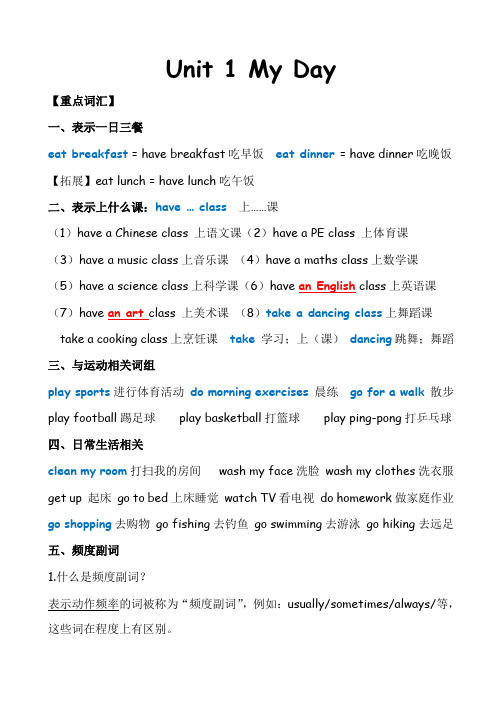
Unit 1 My Day【重点词汇】一、表示一日三餐eat breakfast = have breakfast吃早饭eat dinner= have dinner吃晚饭【拓展】eat lunch = have lunch吃午饭二、表示上什么课:have … class 上……课(1)have a Chinese class 上语文课(2)have a PE class 上体育课(3)have a music class上音乐课(4)have a maths class上数学课(5)have a science class上科学课(6)have an English class上英语课(7)have an art class 上美术课(8)take a dancing class上舞蹈课take a cooking class上烹饪课take学习;上(课)dancing跳舞;舞蹈三、与运动相关词组play sports进行体育活动do morning exercises晨练go for a walk散步play football踢足球play basketball打篮球play ping-pong打乒乓球四、日常生活相关clean my room打扫我的房间wash my face洗脸wash my clothes洗衣服get up 起床go to bed上床睡觉watch TV看电视do homework做家庭作业go shopping去购物go fishing去钓鱼go swimming去游泳go hiking去远足五、频度副词1.什么是频度副词?表示动作频率的词被称为“频度副词”,例如:usually/sometimes/always/等,这些词在程度上有区别。
2.常见频度副词按频率大小排列如下:always(100%)>usually(80%)>often(60%)>sometimes(20%~40%)> never (0%)3.注意频度副词的使用位置:①We usually go to school at seven in the morning.②What do you often do on the weekend?六、常见时间的表达方式1.at + 具体的几点钟;at noon在中午;at night在晚上2.in +月份/季节/早中晚例如:in the morning/afternoon/evening3.关于on表示时间的几种情况:①on + 星期几;②on + 几月几日;③on the weekend在周末;④on Monday morning星期一早上。
【口袋书】人教版PEP五年级下册英语 基础知识汇总

人教版PEP五年级下册基础知识汇总Unit 1 My day.重点单词:[四会]dancing 跳舞;舞蹈exercise 活动;运动take 学习;上(课)[三会]after 在(时间)后start 开始usually 通常地;惯常地Spain 西班牙late 晚;迟a.m.午前;上午p.m.午后;下午why 为什么shop 去买东西;购物work 工作last 上一个的;刚过去的sound 听起来好像also 还;也busy 忙的need 需要play 戏剧;剧本letter 信live 居住island 岛always 总是;一直cave 山洞;洞穴win 获胜重点短语:eat breakfast 吃早饭have … class 上…课play sports 进行体育运动do morning exercises 做早操eat dinner 吃晚饭clean my room 打扫我的房间go for a walk 散步go shopping 去买东西;购物take a dancing class 上舞蹈课go swimming 去游泳start class 开始上课last night 昨天晚上after lunch 午饭以后a lot of fun 许多乐趣live on an island 住在一座岛上be good at sports 擅长体育运动字母组合cl 发/kl/ 音:clean 打扫clock 钟class 课;班级clever 聪明的clock 钟字母组合pl 发/pl/ 音:plate 盘子;碟子eggplant 茄子please 请play 玩耍;戏剧重点句型:1.询问别人什么时候做某事的问句及回答:-- When do/does + 主语+ 动词(短语)原形(+ 其他)?-- 主语(+ 频度副词)+ 动词(短语)原形/ 第三人稀单数形式+ at + 具体时间/ At + 具体时间.-- When do you get up? 你什么时候起床?-- I get up at 5 o'clock. 我5点起床。
人教版PEP小学英语五年级下册知识点汇总(最新)
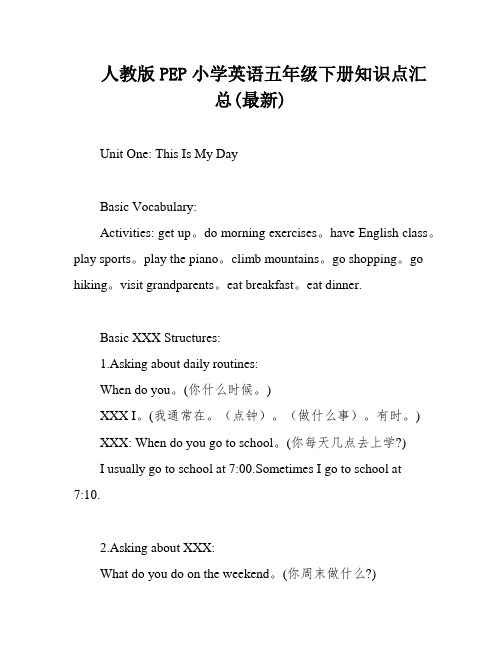
人教版PEP小学英语五年级下册知识点汇总(最新)Unit One: This Is My DayBasic Vocabulary:Activities: get up。
do morning exercises。
have English class。
play sports。
play the piano。
climb mountains。
go shopping。
go hiking。
visit grandparents。
eat breakfast。
eat dinner.Basic XXX Structures:1.Asking about daily routines:When do you。
(你什么时候。
)XXX I。
(我通常在。
(点钟)。
(做什么事)。
有时。
)XXX: When do you go to school。
(你每天几点去上学?)I usually go to school at 7:00.Sometimes I go to school at7:10.2.Asking about XXX:What do you do on the weekend。
(你周末做什么?)XXX I。
(我通常/经常。
有时。
)XXX: What do you do on the weekend?I often play XXX I go shopping with my mom.3.Introducing one's own habits:Every weekend。
I go hiking。
(我每个周末远足。
)Every day。
I do my homework at 8:00 in the evening。
(我每天晚上8点做作业。
)4.Asking XXX:What do you do。
(你是干什么的?)Time:morning。
afternoon。
evening。
noon。
at night。
6:00.on Sunday。
(完整版)人教版PEP五年级下册英语知识点复习总结
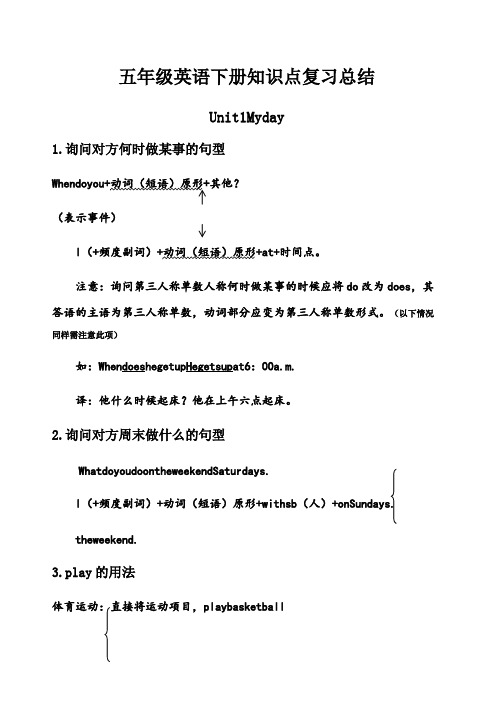
五年级英语下册知识点复习总结
Unit1Myday
1.询问对方何时做某事的句型
Whendoyou+动词(短语)原形+其他? (表示事件)
I(+频度副词)+动词(短语)原形+at+时间点。 注意:询问第三人称单数人称何时做某事的时候应将 do 改为 does,其 答语的主语为第三人称单数,动词部分应变为第三人称单数形式。(以下情况
同样需注意此项)
如:WhendoeshegetupHegetsupat6:00a.m. 译:他什么时候起床?他在上午六点起床。
2.询问对方周末做什么的句型
WhatdoyoudoontheweekendSaturdays. I(+频度副词)+动词(短语)原形+withsb(人)+onSundays. theweekend.
(2)在基数词后加 th:除去 first,second,third,其他基数词变序数词一般 直接在其后加 th。注意 five 与 twelve 要先把 ve 变 f,再加 th;eight 直接加 h;nine 去 e 再加 th。
(3)整十序数词以 ieth 结尾:整十位的序数词先将十位整数词尾的 y 变为 i, 再加 eth。如:twenty-twentieth。
The
注意:play-plays 因为 a 是元音 3)以 ch,sh,s,x 或 o 结尾的动词,在后面加-es; 例如 teach-teacheswash-washesdo-doesgo-goesfix-fixes
4)不规则的; 例如 have-has
5.by 的用法
五年级下册英语Unit2 My favourite season知识点总结复习及练习(含答案)人教PEP
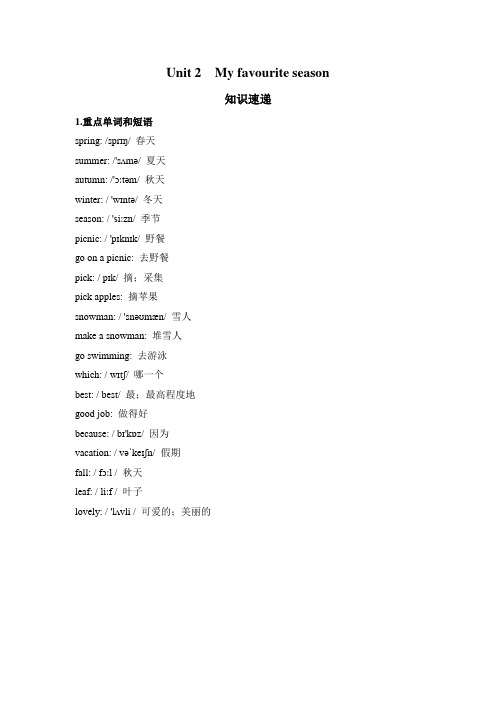
Unit 2 My favourite season知识速递1.重点单词和短语spring: /sprɪŋ/ 春天summer: /'sʌmə/ 夏天autumn: /'ɔːtəm/ 秋天winter: /'wɪntə/ 冬天season: /'siːzn/ 季节picnic: /'pɪknɪk/ 野餐go on a picnic: 去野餐pick: /pɪk/ 摘;采集pick apples: 摘苹果snowman: / 'snəʊmæn/ 雪人make a snowman: 堆雪人go swimming: 去游泳which: /wɪtʃ/ 哪一个best: /best/ 最;最高程度地good job: 做得好because: /bɪ'kɒz/ 因为vacation: / vəˈkeɪʃn/ 假期fall: /fɔːl / 秋天leaf: /liːf / 叶子lovely: / 'lʌvli / 可爱的;美丽的2.语法回顾a.重点单词:spring, summer, autumn, winter, season, go on a picnic, pick apples, make a snowman, go swimming, which, best, because, vacation.b. 询问最喜爱的季节:Which season do you like best?例:① Which season do you like best? (你最喜欢哪个季节?)② Which season does she like best? (她最喜欢哪个季节?)③ Which season do they like best? (他们最喜欢哪个季节?)拓展:Which season do you like best?=What’s your favourite season?练一练:( ) _______ season do you like best?A. WhatB. WhenC. Which回答:①I like spring best. (我最喜欢春天。
【专题】五年级下册英语期中考试复习-单元知识点归纳总结Unit1-3-人教pep

人教pep 五年级英语下册期中考试复习单元知识汇总(unit1-unit3)动词:1.take 学习;上(课)2.pick 摘;采集 名词:1.dancing 跳舞;舞蹈2.exercise 活动;运动3.picnic 野餐4.snowman 雪人 四季: 1.season 季节 2.spring 春天 3.summer 夏天 4.autumn 秋天5.winter 冬天 月份:1.January 一月2.February 二月3.March 三月4.April 四月5.May 五月6.June 六月7.July 七月8.August 八月9.September 九月 10.October 十月 11.November 十一月 12.December 十二月1.do morning exercises 做早操2.eat breakfast 吃早饭3.play sports 进行体育运动4.eat dinner 吃晚饭5.go for a walk 散步6.go shopping 去买东西;购物7.clean my room 打扫我的房间8.take a dancing class 上舞蹈课9.have … class 上……课 10.go on a picnic 去野餐 11.go swimming 去游泳 12.pick apples 摘苹果13.make a snowman堆雪人动词:1.start开始2.shop去买东西;购物3.work工作4.need需要5.live居住6.win获胜7.sound听起来好像8.snow雪9.meet集会;开会10.plant种植11.fall落下;(美)秋天12.paint用颜料绘画名词:1.Spain西班牙2.play戏剧;剧本3.letter信4.island岛5.cave山洞;洞穴6.vacation假期7.leaf叶子(复数leaves)8.thing 事情9.trip旅行10.year年11.contest比赛;竞赛12.holiday 假期;节日13.game 游戏14.chocolate 巧克力形容词:te晚的;迟的st上一个的;刚过去的3.busy忙的4.best最;最高程度的5.pink粉色;粉色的6.lovely可爱的;美丽的7.national国家的8.American美国的节日:1.National Day 国庆日2.Thanksgiving 感恩节3.Christmas 圣诞节4.Easter 复活节5.Women’s Day妇女节6.May Day五一国际劳动节7.Mother’s Day母亲节8.Father’s Day父亲节9.Children’s Day儿童节10.Teachers’ Day教师节其它:1.after在(时间)后2.by在……之前3. when什么时候;何时4.why为什么5. which哪一个6. a.m.午前;上午7. p.m.午后;下午8.always,总是;一直ually通常10.sometimes有时11.often经常12.also还;也13.because因为14.all全;完全15.few不多;很少16.RSVP[(尤用于请柬)请赐复]1.watch TV看电视2.eat lunch吃午饭3.go to bed上床睡觉4.go home回家5.go to school去上学6.good job做得好7.a few一些8.sports meet运动会9.the Great Wall长城10.look for寻找1.典型例句:---When do you do morningexercises? 你什么时候做早操?---At 7 o’clock. 七点。
人教版五年级英语下册全册知识点总结
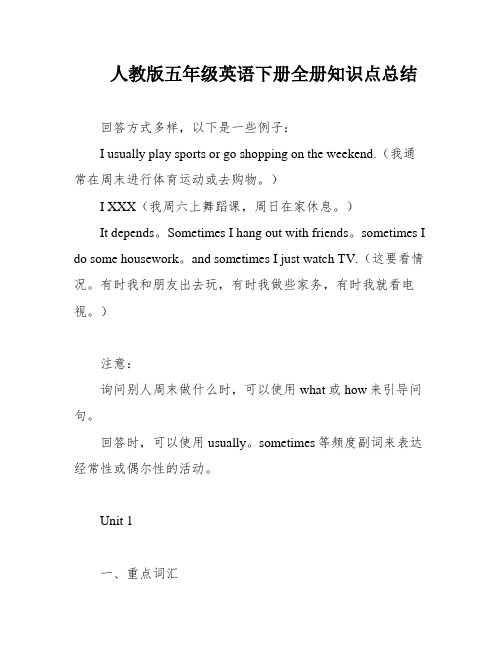
人教版五年级英语下册全册知识点总结回答方式多样,以下是一些例子:I usually play sports or go shopping on the weekend.(我通常在周末进行体育运动或去购物。
)I XXX(我周六上舞蹈课,周日在家休息。
)It depends。
Sometimes I hang out with friends。
sometimes I do some housework。
and sometimes I just watch TV.(这要看情况。
有时我和朋友出去玩,有时我做些家务,有时我就看电视。
)注意:询问别人周末做什么时,可以使用what或how来引导问句。
回答时,可以使用usually。
sometimes等频度副词来表达经常性或偶尔性的活动。
Unit 1一、重点词汇吃早餐:eat breakfast 上······课:have。
class进行体育运动:play sports做早操:do morning exercises 打扫我的房间:clean my room 去购物:go shopping舞蹈:dancing上午:a.m.通常地:usually二、其他日常活动起床:get up上床睡觉:go to bed活动,运动:exercise吃晚饭:eat XXX散步:go for a walk研究,上(课):XXX上舞蹈课:take a dancing class下午:p.m.吃午饭:eat XXX洗脸:XXX洗我的衣服:XXX看电视:watch TV打乒乓球:play ping-pong弹琵琶:play the pipa去游泳:go swimming去跑步:go running做作业:do homework练武术:do XXX踢足球:play football打篮球:play basketball三、语音cl→ [cl]:clean。
人教版PEP小学英语五年级下册unit1至unit3知识点归纳

人教版P E P小学英语五年级下册u n i t1至u n i t3知识点归纳-CAL-FENGHAI.-(YICAI)-Company One1五年级下册Unit 1-3重点难点、单元单词、短语和知识点知识梳理第一单元知识点一、主要单词:do morning exercises晨练,做早操 eat breakfast吃早饭 have English class上英语课 play sports进行体育活动 eat dinner吃晚饭 eat lunch吃午饭 climb mountains爬山 go shopping购物,买东西 play the piano弹钢琴 visit grandparents看望(外)祖父母 go hiking去远足二、主要句子:When do you eat dinner你什么时候吃晚饭I eat dinner at 7:00 in the evening.我晚上七点吃晚饭。
When do you get up你什么时候起床I usually get up at 12:00 at noon.我通常在中午12点起床。
What do you do on the weekend你在周末干什么Usually I watch TV and go shopping.我通常看电视和购物。
Sometimes I visit my grandparents.有时候我去看望我的外祖父母。
I often play football.我经常踢足球。
Sometimes I go hiking.有时候我去远足。
三、同义词eat breakfast—have breakfast eat lunch—have luncheat dinner—have dinner play sports—do sports usually—often复数形式:policeman—policemen policewoman—policewomen现在分词:tell—telling三单:say—says同义句:What do you do ---What are you你是干什么的四、表示频度的副词:always总是,一直 usually通常,常常 often经常 sometimes有时候五、以复数形式出现的词组:visit grandparents plant trees介词后跟表示时间的词语时,表示在某年、某月、某个季节,某个时候(在上午,在下午,在晚上)用in;表示在某一天,在星期几用on,在具体的几点几分用at.七、too 和either的用法区别:too和either都是“也”的意思,但too用于肯定句,either用于否定句。
人教版英语五年级下册知识点总结

人教版英语五年级下册知识点总结一、词汇核心词汇学校生活:classroom, library, playground, office, restroom, schedule, lesson, homework, break, lunch家庭成员:family, father, mother, brother, sister, uncle, aunt, cousin日常活动:get up, go to bed, wash face, brush teeth, eat breakfast, do homework, watch TV, play computer games 食物与饮料:hamburger, hot dog, sandwich, pizza, cake, cookie, milk, juice, water拓展词汇学科名称:math, science, Chinese, English, PE, art, music 颜色与衣物:red, blue, yellow, green, white, black, shirt, pants, shoes, hat, socks动物与植物:cat, dog, fish, bird, rabbit, flower, tree, grass, leaf节假日与活动:birthday, Christmas, Spring Festival, summer vacation, winter vacation, party, picnic二、语法现在进行时表达正在进行的动作或状态。
be动词(am/is/are)+动词-ing形式。
例句:What are you doing? I am reading a book. They are playing football.一般现在时表达经常性的行为或状态。
主语为第三人称单数时,动词形式要发生改变。
例句:She always washes her hands before meals. He often watches TV in the evening.一般过去时表达过去某个时间发生的动作或状态。
(人教PEP版)五年级英语语法复习要点归纳.doc
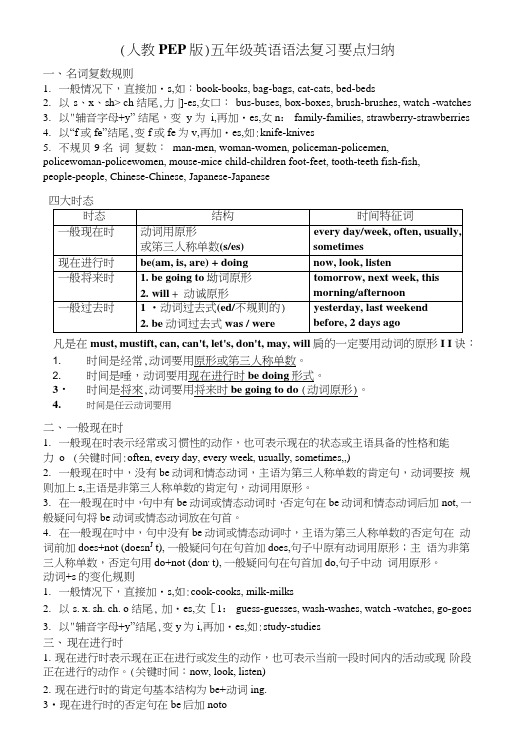
(人教PEP版)五年级英语语法复习要点归纳一、名词复数规则1.一般情况下,直接加・s,如:book-books, bag-bags, cat-cats, bed-beds2.以s、x、sh> ch 结尾,力|]-es,女口:bus-buses, box-boxes, brush-brushes, watch -watches3.以"辅音字母+y” 结尾,变y 为i,再加・es,女n: family-families, strawberry-strawberries4.以“f或fe”结尾,变f或fe为v,再加・es,如:knife-knives5.不规贝9 名词复数:man-men, woman-women, policeman-policemen,policewoman-policewomen, mouse-mice child-children foot-feet, tooth-teeth fish-fish,people-people, Chinese-Chinese, Japanese-Japanese四大时态凡是在must, mustift, can, can't, let's, don't, may, will 肩的一定要用动词的原形I I诀:1. 时间是经常,动词要用原形或笫三人称单数。
2. 时间是唾,动词要用现在进行时be doing形式。
3・时间是将來,动词要用将来时be going to do (动词原形)。
4. 时间是任云动词要用二、一般现在时1.一般现在时表示经常或习惯性的动作,也可表示现在的状态或主语具备的性格和能力o (关键时间:often, every day, every week, usually, sometimes,,)2.一般现在时中,没有be动词和情态动词,主语为第三人称单数的肯定句,动词要按规则加上s,主语是非第三人称单数的肯定句,动词用原形。
(完整版)人教版小学PEP英语五年级下册知识点归纳

人教版小学PEP英语五年级下册知识点归纳PEP五年级英语下册各单元知识点Unit 1 My day一、重点词汇。
1.四会词汇:eat breakfast 吃早饭 have···class 上······课play sports 进行体育运动exercise 活动;运动 domorning exercises做早操eat dinner吃晚饭clean my room 打扫我的房间go shopping 去买东西;购物go for a walk 散步take学习;上(课) dancing跳舞;舞蹈 take a dancing class 上舞蹈课2. 三会词汇:when什么时候after 在(时间)后start 开始usually 通常地;惯常地Spain 西班牙late 晚;迟 a.m. 午前;上午 p.m. 午后;下午why 为什么shop 去买东西;购物work 工作last 上一个的;刚过去的sound 听起来好像also 还;也busy 忙的 need 需要play 戏剧;剧本letter 信live 居住island 岛always 总是;一直cave 山洞;洞穴go swimming 去游泳 win 获胜二、其他日常活动。
get up起床 eat lunch吃午饭 go to bed 上床睡觉wash my face洗脸 wash my clothes 洗我的衣服 watch TV看电视play ping-pong打乒乓球 playthe pipa弹琵琶 go swimming去游泳go running去跑步 do homework 做作业 do kung fu练武术play football踢足球 play basketball打篮球三、频度副词。
always总是,一直(100%) usually通常(80%)often 经常(60%) sometimes(30%)有时四、疑问词。
五年级下册英语Unit1 My day知识点总结复习及练习(含答案) 人教PEP

Unit1 My day知识速递1.重点单词和短语eat breakfast: 吃早饭have…class: 上……课play sports: 进行体育运动exercise: /'eksəsaɪz/ 活动;运动do morning exercise: 做早操eat dinner: 吃晚饭clean my room: 打扫我的房间go for a walk: 散步go shopping: 去买东西;购物take: /teɪk/ 学习;上(课)dancing: /'dɑːnsɪŋ/ 跳舞;舞蹈take a dancing class: 上舞蹈课when: /wen/ 什么时候;何时after: /'ɑːftə/ 在(时间)后start: /stɑːt/ 开始usually: /'juʒuəli/ 通常地;惯常地why: /waɪ/ 为什么always: /'ɔːlweɪz/ 总是;一直busy: /'bɪzɪ/ 忙的need: /niːd/ 需要go swimming: 去游泳win: /wɪn/ 获胜2.语法回顾a. 重点单词:eat breakfast, have…class, play sports, exercise, do morning exercise, eat dinner, clean my room, go for a walk, go shopping, take a dancing class, when, usually, why, always, go swimming, win, need.b. 询问何时做某事:When do you……?例:①When do you get up? (你什么时候起床?)②When do you do morning exercises? (你们什么时候做早操?)③When do they go to school? (他们什么时候去上学?)拓展:When does she eat breakfast?练一练:( ) —When______ you do morning exercises?A. doesB. doC. are( ) —When______ she go to bed?A. doesB. doC. arec. 询问他人周末做什么:What do you do on the weekend?例:①What do you do on the weekend? (你周末做什么?)②What does she do on the weekend? (她周末做什么?)回答:①I usually clean my room. (我通常打扫房间。
PEP人教版五年级英语下册重要知识点归纳

易错知识点整理:1.like 喜欢句型结构:①主语+like+sth./sb. 例:I like ice cream. 我喜欢冰淇淋。
②主语+like(s)+doing sth.例:①I like running. 我喜欢跑步。
②He likes making a snowman in winter.他在冬天喜欢堆雪人。
2.and与or, but与because1)and “和“表示并列的关系,两者都被包含;or”或者“含选择意义,两者选其一。
例:①The winter vacation is in January and February. 寒假在一月和二月。
②Mid-Autumn is in September or October.中秋节在九月或者十月。
2)but“但是“,表示转折,be cause”因为”,表示解释前一句的原因。
例:①I like summer, but I can’t swim. 我喜欢夏天,但是我不会游泳。
②I like summer, because I can go swimming every day. 我喜欢夏天,因为我可以每天去游泳。
3.have的用法1)h ave +一日三餐, 表示”吃…餐” ,与eat一样,如:eat/have breakfast吃早餐2)h ave…class 上…课,结构:have +名词/动名词(动词ing)+class例:have Chinese class上语文课have art class 上美术课have swimming class 上游泳课have dancing class上舞蹈课4.go+动名词(动词-ing)表示”去…”go swimming 去游泳go running 去跑步go shopping 去购物go fishing 去钓鱼go dancing 去跳舞5.There be(is,are)... 意为”…有..”一般指“某地方有某人或某物。
- 1、下载文档前请自行甄别文档内容的完整性,平台不提供额外的编辑、内容补充、找答案等附加服务。
- 2、"仅部分预览"的文档,不可在线预览部分如存在完整性等问题,可反馈申请退款(可完整预览的文档不适用该条件!)。
- 3、如文档侵犯您的权益,请联系客服反馈,我们会尽快为您处理(人工客服工作时间:9:00-18:30)。
五年级英语下册知识点复习总结Unit 1 My day1.询问对方何时做某事的句型When do you + 动词(短语)原形+ 其他?(表示事件)I(+频度副词)+动词(短语)原形+ at +时间点。
注意:询问第三人称单数人称何时做某事的时候应将do改为does,其答语的主语为第三人称单数,动词部分应变为第三人称单数形式。
(以下情况同样需注意此项)如:When does he get up? He gets up at 6:00 a.m.译:他什么时候起床?他在上午六点起床。
2.询问对方周末做什么的句型What do you do on the weekend? Saturdays.I(+频度副词)+动词(短语)原形+ with sb(人)+ on Sundays.the weekend.3.play的用法体育运动:直接将运动项目,play basketballPlay 乐器:先加the再加乐器,play the piano电脑:play on the computer4.like的用法名词(n):喜欢某人或某物like to do sth:喜欢做某事(着重于某一次喜欢)doing sth:喜欢做某事(着重于日常习惯爱好)例:I like reading,but I do not like to read this evening.译:我喜欢读书,但是今晚我不喜欢读书。
5.be good …的区别at 擅长be good to 对…好for 有益于6.动词变第三人称单数的变化规则1)一般情况下,动词后面直接加-s;例如work-works live-lives play-plays sing-sings2)以辅音字母+y结尾的动词把y变为i再加-es;例如study-studies try-tries carry-carries fly-flies cry-cries注意:play-plays 因为a是元音3)以ch,sh,s,x或o结尾的动词,在后面加-es;例如teach-teaches wash-washes do-does go-goes fix-fixes4)不规则的;例如have-hasUnit 2 My favourite season1.询问对方最喜欢的季节的句型Which season do you like best?I like + 某个季节+ best./某个季节.或:What is your favourite season?My favourite season is + 季节.==== 季节is my favourite season.2.询问对方最喜欢某个季节的原因的句型Why do you like + 季节+ best?/Why?like (查询like的使用方法).如:I like eating ice cream.Because Ican + 动词原形. 如:I can swim.3.询问天气的句型What is the weather like + 其他?How is the weather + 其他?如:What is the weather like in Beijing in spring?等同于:How is the weather in Beijing in spring?译:北京春天的天气怎么样?4.特殊疑问词的区分where:哪里(问地点)why:为什么(问原因,回答用Because) what :什么(问具体内容)when:什么时候(问时间)which:哪个(问哪一个)whose:谁的(回答用It is.. These/Those are等)Unit 3 My school calendar1.询问节日在什么时候的句型When + is + 节日名称?节日名称in + 月份.isIt on + 具体某一天.2.询问某个节日时对方将要(为别人)做什么的句型What will you do(for sb)+ on + 节日名称?I/We will + 动词(短语)原形+(for sb)+ on + 节日名称.3.will的用法will表示将来时,表示这件事现在还没有发生,但是会发生在未来。
Will后面直接使用动词原形。
4.a few的用法A few 一些,常修饰可数名词复数,表示肯定意义。
(例:We have a few fun things in spring.在春天,我们有一些有趣的事情。
) few单独修饰名词复数时,表示否定意义,意为“不多,很少,几乎没有”。
(例:Mum,we have few eggs.妈妈,我们几乎没有鸡蛋了。
)5.by的用法by可表示在…之前。
(例:Please send me an email by March 23rd.请在3月23号之前给我发邮件。
)6.at、in、on的区别at + 时间点in + 月份on + 具体某一天(几月几日)Unit 4 When is Easter?1.询问节日活动日期的句型When + is + 节日/活动名称?节日/活动名称in + 月份.is 某月某日(具体某一天).It onthe+序数词+星期+in+月份.(几月的第几个星期几)2.基数词变序数词的方法(1)特殊变化的有3个:first (1st) 第一、second (2nd) 第二、third (3rd) 第三,需要逐个地硬记下来。
(2)在基数词后加th:除去first,second,third,其他基数词变序数词一般直接在其后加th。
注意five与twelve要先把ve变f,再加th;eight直接加h;nine去e再加th。
(3)整十序数词以ieth结尾:整十位的序数词先将十位整数词尾的y变为i,再加eth。
如:twenty-twentieth。
(4)表示几十几的序数词:十位数不动,把个位数变为序数词即可。
3.小句式(1)名词+ is the + 序数词+其他内容。
(译为:在…中,名词是第几.)(2)There are + 基数词+ 名词。
(译为:那有多少个….)(3)表示某人多少岁时用基数词。
4.want的用法sth:想要某物Want to do sth:想要做某事sb to do sth:想要某人做某事Unit 5 Whose dog is it?人称代词与物主代词一览表1)主格:作主语,表示谁怎么样了,干什么了。
如:I am a teacher.2)宾格:作宾语,用在动词或介词后表示动作行为的对象。
如:I can play with you.3)形容词性物主代词:后面+名词。
如:This is my book.4)名词性物主代词:形容词性物主代词+名词,其后不加名词。
如:The book is hers.1.询问某物属于谁的句型Whose + (名词物) + be动词+ 代词?如:Whose dog is this?It is 形容词性物主代词+ 名词.They are 名词性物主代词.2.询问某物是否属于某人的句型Be动词+ 主语(物) + 名词性物主代词?如:Are these pictures ours?回答:肯定:Yes,主语(相应的代词)+be动词.否定:No,主语(相应的代词)+be动词+not.3.表达某物属于某人的句型主语(物) + Be动词+ 名词性物主代词。
如:The carrots are theirs.4.所有格的用法(1)of所有格。
表示无生命的东西的所属关系多用of所有格。
如:a picture of beijing the windows of the rooma map of the world the color of the clothes(2)’s所有格。
表示有生命的东西的所属关系多用名词的’s所有格。
如:Amy’s book. The rabbit’s carrots.5.询问某人/某物是否正在做某事的句型Be动词+主语+现在分词+其他?如:Is he drinking water?回答:肯定:Yes,主语+be动词.否定:No,主语+be动词+not.6. 表示某人/某物正在做某事的句型主语+be动词+现在分词+其他?如:He's eating.7. 询问某人能否做某事的句型Can+主语+动词(短语)+其他?如:Can I play with him now?回答:肯定:Yes,主语+can.否定:No,主语+can+not.8. 询问某人/某物正在做什么的句型What+be动词+主语+现在分词?如:What are you doing?回答:使用句式6.9. 动词变现在分词形式的变化规则1)一般情况下,直接在动词原形末尾加-ing构成:work-working 工作sleep-sleeping 睡wait-waiting等待study-studying 学习read-reading 读talk-talking 谈话2)以不发音的e结尾的动词,先去e再加-ing:smile-smiling 微笑move-moving移动write-writing 写但是,若是发音的e结尾,则不能去e:see-seeing 看见agree-agreeing 同意3)以字母ie结尾的动词,通常将ie改为y,再加ing:die-dying 死lie-lying 躺4)以重读闭音节结尾且末尾只有一个辅音字母的动词,要双写末尾的辅音字母再加-ing:sit-sitting坐plan-planning 计划swim-swimming游泳Unit 6 Work quietly!1.含实义动词的一般疑问句Do/Does + 主语+ 动词原形+ 其他?如:Do you see any elephants?回答:肯定:Yes,主语+do/does.否定:No,主语+do not/does not.2.any和some的用法any表示“一些”用于否定句和一般疑问句,修饰可数名词复数和不可数名词。
Some表示“一些”用于肯定句,修饰可数名词复数和不可数名词。
3.be动词的用法口诀我用am,你用are,is连着他她它,人称复数都用are,A and B还是are,单数名词用is,复数名词全用are,不可数名词用is.4.a、an的用法截止到现阶段使用a还是an,需要看它后面的名词的第一个字母是元音字母还是辅音字母。
若第一个字母是元音字母(a,e,i,o,u),则前面用an;若第一个字母是辅音字母,则前面用a。
Recycle1 & Recycle21.询问天气如何How's the weather? 或What's the weather like?例句:How's the weather in Beijing in April? 四月北京天气怎样?How's the weather in April in Beijing?What's the weather like in London in winter? 伦敦冬天天气怎样?What's the weather like in winter in London?2.字母组合发音Unit1:cl /kl/:clean clock class cleverpl /pl/:plate eggplant please playUnit2:br /br/:browm library brother umbrellagr /gr/:green grapes grandpa growUnit3:ch /tʃ/:China chicken lunch teachersh /ʃ/:sheep fish shirt shortsUnit4:th /θ/:three thin thieteen mathsth /δ/:this that mother brotherUnit5:ng /η/:long sing ring youngnk /ηk/:think ink trunk pinkUnit6:wh /w/:what when wherewh /u:/:who whose。
